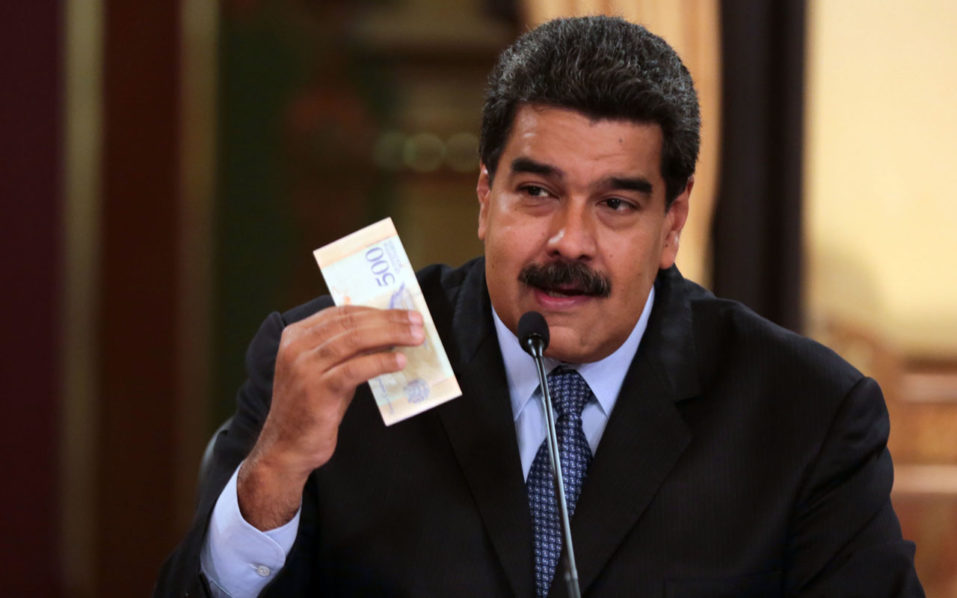
Venezuela will start issuing new banknotes on Monday after slashing five zeroes off the crippled bolivar, but analysts warn the measure will do nothing to stop a worsening economic crisis.
President Nicolas Maduro has described the move as a “great change” as the government attempts to halt spiraling hyperinflation that the International Monetary Fund predicts will hit a staggering one million percent this year.
Electronic transactions are set to be suspended from Sunday to facilitate the introduction of the new notes, known as the sovereign bolivar to distinguish from the current, and ironically named, strong bolivar.
The largest will be worth 500 bolivars, equivalent to 50 million in today’s money — or eight dollars on the black market.
Towards the end of 2016, Venezuela’s largest currency denomination was 100 bolivars — but less than a year later, the government began issuing 100,000 bolivar notes, which are now almost worthless.
Ahead of the relaunched currency, Maduro announce a minimum wage hike Friday, the fifth so far this year.
Maduro set the new monthly minimum wage to 1,800 sovereign bolivars (about $28), a nearly 3,500 percent increase from the previous level of 5.2 million (less than a dollar at the predominant black market rate).
The president blames Venezuela’s financial woes on opposition “plots” and American sanctions — but admits that the government will “learn as we go along” when it comes to the currency redenomination.
– ‘Failure’ –
Uncertainty, doubt and skepticism reign.
“If you maintain the fiscal deficit and the disorganized emission of money (to cover it), then the crisis will worsen,” economist Jean Paul Leidenz told AFP.
Oil-rich Venezuela is in a fourth year of recession and has been hamstrung by food and medicine shortages, as well as failing public services such as transport, electricity and water.
Oil production accounts for 96 percent of Venezuela’s revenue but that has slumped to a 30-year low of 1.4 million barrels a day, compared to its record high of 3.2 million 10 years ago.
The fiscal deficit is almost 20 percent of GDP while Venezuela struggles with an external debt of $150 billion.
And there’s a good reason the redenomination hasn’t generated renewed hope or investor confidence: Venezuela has done this before.
Maduro’s predecessor and revolutionary hero Hugo Chavez stripped three zeroes off the bolivar in 2008, but that failed to prevent hyperinflation.
Oliveros warned that the new bank notes will face the same fate as the last ones “within a few months” if hyperinflation is not brought under control.
According to Leidenz, Venezuela is trying to emulate Brazil, which replaced its old cruzeiro currency with the real in the 1990s after the former was destroyed by hyperinflation.
But he said that will not work because of the government’s fiscal indiscipline and a lack of financing.
– Cryptocurrency confusion –
The government, though, has ploughed on, with Maduro insisting the bolivar would be anchored to the country’s widely discredited petro cryptocurrency, along with new salary and pricing systems.
Venezuela launched the digital currency in a bid for liquidity to try to circumvent US sanctions, with Maduro saying it would be backed by the country’s oil reserves.
Since the presale of the petro ended in March, the government claims to have received $5 billion in offers, yet five months later there is “enormous confusion,” Leidenz said.
Cryptocurrency rating site ICOindex.com has branded the petro a “scam,” while the US has banned its nationals from trading in it.
“Anchoring the bolivar to the petro is anchoring it to nothing,” said economist Luis Vicente Leon, director at polling organization Datanalisis.
Right from the outset, it has not been clear how the petro would operate, nor what being backed by oil means.
But it is one of a raft of seemingly desperate economic measures announced by Maduro’s government to try to fix the country’s economic meltdown.
Earlier this week, Maduro also announced a curb on heavily subsidized fuel in a bid to prevent oil being smuggled to other countries.
Subsidies would only be available to citizens registering their vehicles for a “fatherland card” the opposition has decried as a mechanism to exert social control over opponents.
Fuel subsidies have cost Venezuela $10 billion since 2012, according to oil analyst Luis Oliveros, but without them most Venezuelans would not be able to buy fuel.
Meanwhile, two weeks ago, Venezuela loosened its vice-like grip on currency controls in a bid to attract foreign investment.
It ended the government’s monopoly over foreign currencies, which had created a black market where the dollar could change hands for 30 times its official rate.
[ad unit=2]



